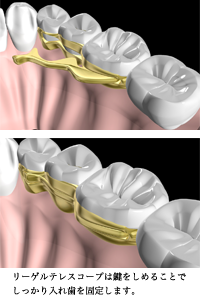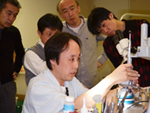2010年6月16日
What is the lifespan of implants and the telescope system?
Q. What is the lifespan of implants and the telescope system?
A. When I graduated college 12 years ago, there were very few dentists who were treating with implants.There were also very few students studying in the implants department and you can say that it wasn't very popular. In recent years, however, nearly all clinics offer implants. In the last year alone, the research association with the most astounding growth in number of members has been the Japanese Society of Oral Implantology. They gained 1,345 members just last year. It is even said among dentistry circles that we are experiencing and 'implant bubble'.
It is written that implants have a lifespan of 40 years. However, does this estimate reflect the case scenarios from each clinic? 12 years ago no dentists were even offering implants so this information is hard to believe.
Of course this can be possible if the patient has never suffered from gingivitis, has never had a systemic illness, and has perfect bite alignment. But I think that we need to be careful about making overestimations.
Implants are not natural teeth so they will not develop cavities. However, gums are not artificial. Without proper care it is easy to develop gingivitis. The circumstances change even more if you are a smoker. It is important to seek correct information and counseling from a dentist before getting implants.
Generally implants last at a rate of 90% over a 10 year period. This means if you choose to go with implants then you should see a dentist with a 90% success rate in implant patients from 10 years ago.
So what about the telescope system? At our clinic you can see results from 30 years ago. That is to say, Shigeru Inaba, our clinic's advisor, was the first person to import the telescope system to Japan from Germany 32 years ago. There are patients who received treatment at that time and are still using their dentures today. Unfortunately there are a few exceptions, but in those cases they have had dentures remade with other telescope methods. At the very least, these dentures can be used for more than 10 years.
All my patients whom I have treated with the telescope system when I first became a dentist almost 10 years ago are still using their dentures as if they were their own natural teeth. Among these patients, some have lost more teeth due to cracked roots and advancing gingivitis. However, one special feature of dentures made using the telescope system is that they can be removed and adjusted to fit the changing form of the mouth.
We are prepared to treat many different situations. This is a superior system that uses designs that take into consideration changes that may occur 10, 20 and even 30 years into the future.
2010年6月14日
What choices are there other than implants? (woman in her 40s)
Q. When I was a high school student 25 years ago I lost my lower number 6 molar on the left side of my mouth and had to get a bridge in my 20s. 5 years ago, the lower number 7 molar that was supporting my bridge went bad and fell out. I have gingivitis and was told that I didn't have enough bone for implants so I went with dentures. My partial dentures were covered by insurance but they are just so uncomfortable.
It was recommended to me that I get implants before, but I have always been resistant to the idea. Please let me know if there are any treatment methods other than implants.
In recent years I have seen many patients who are resistant to implants and would prefer another method if possible. Implants are a wonderful technology under the right conditions. However, they are not the best choice in every situation. In actuality, implants may not be appropriate for patients depending on factors such as bone mass, smoker status, systemic illnesses, or gingivitis.

People in their 40s who get implants must also consider 10, 20 and even 30 years in the future.So you say that you are missing 2 molars.
I will tell you about partial dentures for 2 teeth made through our most requested process, Riegel telescope. Normally, dentures covered by insurance are supported by metal springs. They are esthetically inferior and tend to move around a lot. Our dentures made using Riegel telescope feature locking equipment that makes putting in and taking out dentures simple by using an opening and closing mechanism. This means that our dentures do not have metal springs.
 Since dentures covered by health insurance grip the teeth with metal springs, the subduction sensation (movement) that accompanies biting can be quite noticeable. Since this pressure is transferred directly to the teeth, they are wiggled and may come loose. Compare this to a 2-tooth linking and fixing dentures that uses Riegel telescope as a foundation layered doubly over the teeth. By locking the mechanism your partial dentures will stay firmly in place. Dentures made using the Riegel telescope method only move about 300 microns when biting. And since the teeth supporting the dentures only absorb 120 microns of that movement, there is virtually no burden on the teeth. A firm bite and pleasing esthetics are special characteristics of these dentures.
Since dentures covered by health insurance grip the teeth with metal springs, the subduction sensation (movement) that accompanies biting can be quite noticeable. Since this pressure is transferred directly to the teeth, they are wiggled and may come loose. Compare this to a 2-tooth linking and fixing dentures that uses Riegel telescope as a foundation layered doubly over the teeth. By locking the mechanism your partial dentures will stay firmly in place. Dentures made using the Riegel telescope method only move about 300 microns when biting. And since the teeth supporting the dentures only absorb 120 microns of that movement, there is virtually no burden on the teeth. A firm bite and pleasing esthetics are special characteristics of these dentures.
In recent years dentures have been developed in which the metal clasps (springs) have been replaced with invisible silicon-type parts. But it is hard to say much about their history and cases treated with them. Even if dentures look nice, they are meaningless if you cannot secure a firm and comfortable bite.
Some sites advertise 'If they don't fit right then you can return them'. But I have reservations recommending a product that can be so easily made and returned.
Since the technology used to create dentures using the Riegel telescope method is so precise, in some cases the manufacturing process can take as long as 2 or 3 months. These are implements order-made to the exact contours of our patients' mouths so it can take some time. But I can confidently say that you will be able to use Riegel telescope dentures firmly as if they were your own teeth.
2010年6月11日
The alignment of my false teeth is off. What negative consequences can I expect? (man in his 40s)
Q. I am in my mid 40s and almost all of my teeth are false teeth. If the alignment of my false teeth is off, what kinds of negative consequences can I expect? I get stiff shoulders and headaches and I am wondering if this is the reason.
A. By false teeth, I am assuming that you mean that most of your teeth are crowned? If you treat each tooth individually, there is a good chance that the balance of your mouth is off.
Your upper and lower teeth work together in balance and harmony. If you continuously require crowns to be put in one by one because of cavity or nerve treatment, eventually, your original tooth configuration is going change drastically. For example, the height of your left and right bite alignment could differ, and the size of your teeth can differ as well. So it is important to avoid treating your teeth one by one. Rather, you should seek treatment for all of them as a unit keeping balance in mind.
So you have asked, "If the alignment of my false teeth is off, what kinds of negative consequences can I expect?"
There are many people with this condition who complain of the following symptoms: "I cannot open my jaw widely", "The joints in my jaw hurt", and also, "My neck hurts", "I have stiff shoulders", "My back hurts", "My hands and legs go numb", "My ears are ringing", "I get bad migraines". These are the most common symptoms I hear. Most of them are similar to symptoms of TMJ arthrosis.
TMJ arthrosis is a condition in which the area around the jaw hurts, opening the mouth becomes difficult, and a clicking, scraping, or popping noise can be heard coming from the jawline area. There are many causes of TMJ arthrosis such as having poor tooth alignment, or poor bite alignment balance due to wisdom teeth. It is especially common to see this ailment caused by silver crowns, fillings, or dentures that throw off the balance of one's bite alignment. First, it is necessary to have your bite alignment examined to make sure that it is correct (this is called occlusion diagnosis). Through occlusion diagnosis you can learn about your bilateral balance, and whether or not there is shifting about your body's central axis. It is very important to accurately adjust your bite alignment plane.
2010年6月 9日
I want to get invisible clasp dentures not through insurance. (woman in her 30s)
 Q. I had to get teeth numbers 6 and 7 in my upper right jaw, and teeth numbers 5, 6, and 7 in my lower left jaw removed due to cavities, so now I have dentures. I hate that people can see the metal clasps on my dentures. I want to get invisible clasp dentures not through insurance. (woman in her 30s)
Q. I had to get teeth numbers 6 and 7 in my upper right jaw, and teeth numbers 5, 6, and 7 in my lower left jaw removed due to cavities, so now I have dentures. I hate that people can see the metal clasps on my dentures. I want to get invisible clasp dentures not through insurance. (woman in her 30s)
1. What are those silicon false teeth that don't require metallic clasps?
2. Do dentures with metal clasps last longer than those without?
3. I read somewhere that when it comes to biting, smile dentures are less effective than dentures covered by insurance and that using them causes your jaw to look emaciated. Do you know anything about this?
Thank you for your answers.
A. Partial dentures covered by health insurance have metal clasps that hook onto your remaining teeth. Also, everyone can tell that you are wearing them. In recent years many people are choosing to pay for dentures themselves for these reasons.
1. What are those silicon false teeth that don't require metallic clasps?
These dentures use silicon springs that grip to the base of your tooth around the gum line instead of the conventional metal springs. It is true that they are esthetically pleasing, but biting strength is sacrificed. This is because retention force is weak, which causes the dentures to move around a lot. Not to mention, it is rather easy for food particles to be caught between the springs and the gum line.
Also, these dentures put a lot of stress on remaining teeth due to membrane subduction of the dentures when biting (compared to the part of your mouth with teeth, the gums experience 1 - 2 millimeters of subduction like a cushion). The teeth take on a lot of the burden and it is possible that in the future one may lose more teeth because of this. Also, these types of dentures are relatively new and there is no evidence as to how long they last.
2. Do dentures with metal clasps last longer than those without?
Dentures with metal clasps last up to 7 years. Actually, this is the normal case for teeth that still have nerves. If your teeth are missing nerves then they may become lose after only a few months.
3. I read somewhere that when it comes to biting, smile dentures are less effective than dentures covered by insurance and that using them causes your jaw to look emaciated. Do you know anything about this?
When your dentures move, your jaw bone absorbs the shock. Therefore, this is definitely possible. In recent years, it has become easy to produce non-clasp type silicon dentures and smile dentures, and these kinds of cheap dentures are increasing. However, they have little history and there are no reports concerning long-term case studies. These types of dentures almost all lack a rest. A rest is a piece that transmits force. It transfers force to the tips of the teeth roots. Clasps are necessary to keep the false teeth in place, but you should really prioritize the rest piece. It is important to have your teeth examined using a 3-D method.
So what happens if your dentures do not have a rest? Not only will your jaw lose muscle, but your teeth will wiggle and you may end up losing more within a few years. At first look, these new, cheap dentures are quite beautiful, but in the long term, I think that people who use them may regret it.
At our clinic we recommend the telescope system, which are dentures that have more than 120 years of history in Germany. And since metal parts are invisible do to our superior technology and materials, these dentures are quite popular with younger people.
 Since the retentive mechanism of these dentures does not rely on metal springs, it takes about 3 months after treatment before you can actually put them on (Of course we can provide false teeth in the meantime so that you can pass the time without worrying). This is because the manufacturing process and the technology is extremely precise (There are very few dentists and dental technicians in Japan who can use this incredibly precise technology).
Since the retentive mechanism of these dentures does not rely on metal springs, it takes about 3 months after treatment before you can actually put them on (Of course we can provide false teeth in the meantime so that you can pass the time without worrying). This is because the manufacturing process and the technology is extremely precise (There are very few dentists and dental technicians in Japan who can use this incredibly precise technology).
Since the dentures do not move around in your mouth, there is very little force being absorbed into your jaw and your remaining teeth are protected further by being held firmly in place. Once you put these dentures on, you can enjoy them as a part of your own body for at least 10 years.
Since the telescope system allows for adjustments, some of our clinic's patients have had the same pair of dentures for over 30 years!
Whether you end up losing your teeth or protecting them over the next 10, 20, or 30 years is a matter of what kind of dentures you choose. We urge you to think carefully about this very important decision.
What is the Telescopic System?
2010年6月 4日
Maintaining your natural teeth as long as possible
Our clinic's telescope system partial dentures barely wiggle the teeth at all. Rather, they link the teeth into place, extending their lifespan.
Important points for maintaining your natural teeth as long as possible
+ Fix them in place, including the weak ones, as much as possible.
(Teeth are susceptible to side-to-side wiggling. It is important to fix them into place as to prevent movement)
+ Make sure that your bite alignment is correct.
+ Have partial dentures put in that do not move your teeth.
What should I watch out for when getting dentures for the first time?
We receive these kinds of questions a lot. It is normal to want to know what to look out for after treatment. As you would expect, periodic maintenance is very important. Go to the dentist to have stains that you cannot remove on your own no matter how much you brush removed professionally. It is also a good idea to have your bite alignment examined to make sure that you are exerting force throughout your whole bite and not putting extraneous force on your partial dentures. It is not very easy to discuss dentures with your friends. But please feel free to come into our clinic so we can discuss anything that you may be worrying about.









